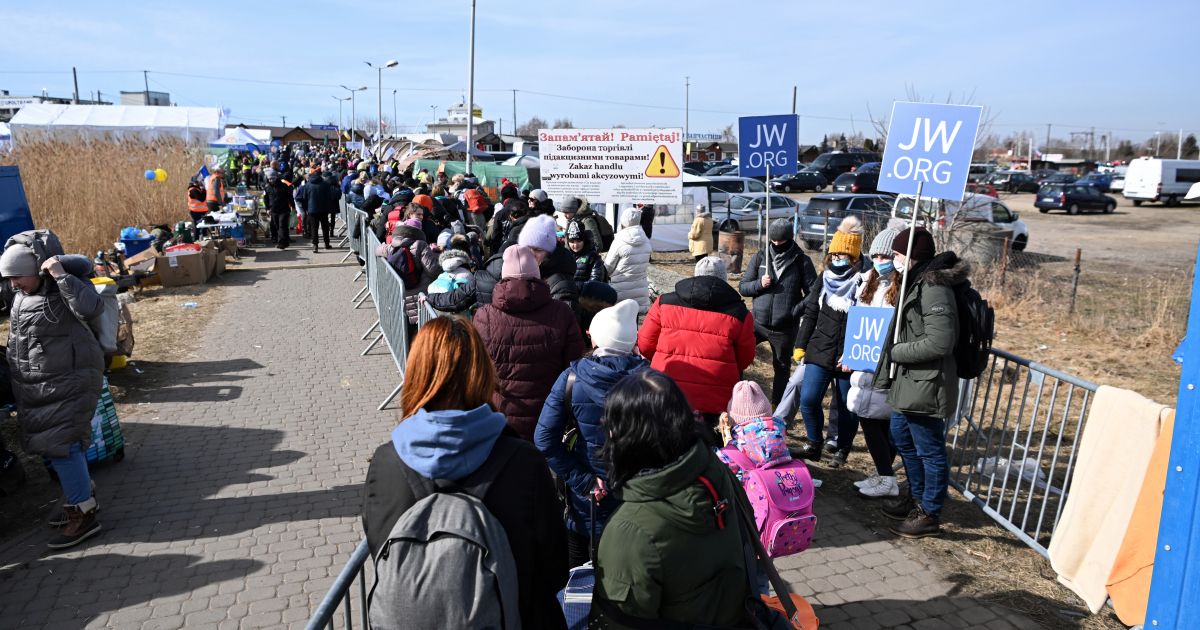A European human rights organization has warned of human trafficking and exploitation of women and children fleeing the war in Ukraine, at a time when refugees from this country continue to arrive in neighboring countries.
In its report on the waves of asylum from Ukraine towards countries in eastern Europe, the British newspaper "The Guardian" quoted human rights defenders recording cases of disappearance of children and women after crossing the border, and their capture by elements linked to illegal acts.
The newspaper stated that organizations received reports of cases of human trafficking and abuse of women who found themselves in illegal work, who were mistreated and deprived of their salaries, in addition to cases of extortion of personal documents or money.
It quoted a coordinator in the "Homo Faber" organization, which is active in the Polish city of Lublin, as saying that some of those who offer to help refugees fleeing from Ukraine who arrive on trains are criminals who target women.
It also quoted a Slovak anti-trafficking organization that a specialized security team intervened after suspecting cases of human trafficking targeting women and children who came to Slovakia from Ukraine.
The Guardian indicated that, in the midst of the current refugee crisis, Poland last Tuesday amended a law on human trafficking, increasing the penalty for those convicted of this crime from 3 years to 10 years in prison.
In the same context, the Czech police warned refugees of fraudsters who provide assistance with visas and other assistance in exchange for money, or take personal data that can be misused in theft or money laundering operations.
It also urged caution about suspicious job offers that could lead to forced prostitution or human smuggling.
The influx of refugees
Meanwhile, Ukraine's neighboring countries announced the arrival of additional numbers of refugees fleeing their country to their lands, especially to Poland, which said that the total number on its lands exceeded 1.6 million people.
But these countries made it clear today, Saturday, that the number of refugees to them from Ukraine decreased compared to previous days.
This comes at a time when governments of Ukraine's neighboring countries and volunteers are struggling to provide shelter for the 2.6 million refugees, mostly women and children, who have fled since the start of Russia's war on Ukraine.
German Foreign Minister Annalina Birbock announced that Berlin is working with international partners to establish an air bridge to transport Ukrainian refugees from Moldova, noting that 2,500 refugees will be transferred directly to Germany as a first step.
While the largest number of refugees flowed to Poland, Romania received 380,000 refugees, Hungary 230,000, Slovakia 185, and the Czech Republic 200,000.
With the increase in the number of Ukrainian refugees in European countries, the European Union activate the so-called temporary protection system for refugees, which was established in 2001 in response to the repercussions of the war in the former Yugoslavia;
It had not been used before, despite the arrival of more than a million refugees in 2015, most of them from Syria.
This program provides Ukrainians with free train and bus trips, and accommodation for some in reception centers, and allows them to receive social welfare benefits, and possibly medical care. Persons who have been living in Ukraine for a short period, such as foreign students, are excluded from the protection system.
The system also allows granting residency to refugees for a maximum period of 3 years under certain conditions.
accusations of discrimination
On the other hand, Human Rights Watch accused Ukraine of discriminating against foreigners fleeing the war on its territory.
The organization said foreigners living in Ukraine faced discriminatory treatment and delays while trying to flee the war.
In turn, Amnesty International called on European governments to welcome refugees from Ukraine without discrimination, and stressed that these refugees are welcomed without discrimination, as it put it.

